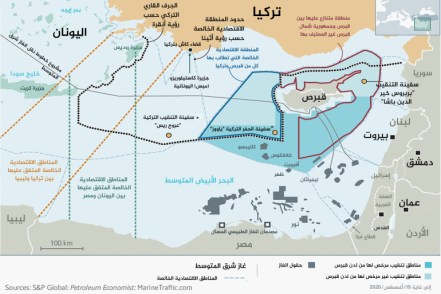French President Emmanuel Macron today urged Europe to show a unified and firm stance towards the "unacceptable" behavior of Turkey in the Eastern Mediterranean, and said that Turkey is no longer a partner in the Eastern Mediterranean. In return, the Turkish Foreign Ministry responded to Macron's statements, describing them as rude, and that they betray "thought Old colonial. "
During a press conference before the start of the Southern European Summit, Macron called on European countries to be more firm with Turkish President Recep Tayyip Erdogan, and to decide what should be done after opening dialogue with the Turkish side, but with strict conditions, he said.
The French president considered that the agreements concluded by Turkey with the Libyan government regarding the demarcation of maritime borders threaten the legitimate rights of Greece, as he described, adding that exploration operations in the Cyprus economic zone are unacceptable.
Macron added that Turkey is no longer a partner in the Eastern Mediterranean, and asked it to clarify its intentions in some areas to launch a fruitful dialogue with it.
The Turkish authorities' response was not late, as the Foreign Ministry attacked President Macron, saying that he was trying to offer lessons from behind the scenes, describing his statements today as impudent, which stem from "an old colonial thought."
In a statement, the Turkish Foreign Ministry considered that it is not within Macron's authority to determine the maritime sphere of influence for any country, not in the Mediterranean or anywhere in the world.
The ministry stressed the need for France to take a stance in favor of reconciliation and dialogue, adding that France's standing on the side of Greece "encourages tension and threatens the major interests of Europe and the European Union."
For months, the dispute over sovereignty over maritime areas in the eastern Mediterranean and the Aegean Sea has escalated between Turkey on the one hand and Greece supported by European countries on the other hand, and France is one of the most European countries that support the Greek position towards the conflict with Turkey, to the point where Paris has recently deployed military equipment in the region. Tense.
A mini-summit
Macron will participate in the seventh summit of the "MED7" group, which is an informal meeting between the countries of the south in the European Union, with the prime ministers of Italy Giuseppe Conte, Spain's Pedro Sanchez, Greece Kyriakos Mitsotakis, Portugal Antonio Costa, Malta Robert Abela, and Cypriot President Nikos Anastasiades, leaders of southern European countries will discuss several issues on the French island of Corsica, especially the tension in the eastern Mediterranean.
In a related context, the Greek Prime Minister said that the European Union should impose "meaningful" sanctions on Turkey if it does not withdraw its naval vessels from the disputed areas in the eastern Mediterranean, at a time when Ankara is holding consultations on oil and gas exploration with the Libyan Government of National Accord.
"We really need dialogue, but not under threat, which threatens the security and stability of my country and threatens the prosperity and safety of all member states of the European Union," Mitsotakis said in an article published on Thursday in the British "Times" newspapers, the German "Frankfurt Public" and "Le Monde of France".
This month, EU leaders are expected to determine their response to Turkey, and the Greek prime minister wrote that if Turkey did not withdraw its naval vessels, "meaningful sanctions" should be imposed on it.
Map showing the intricacies and overlaps of disputed maritime borders in the Eastern Mediterranean region (The Economist)
NATO meeting
Despite the escalation of tension between Athens and Ankara, Al-Jazeera correspondent quoted a Turkish military source as saying that a technical meeting will take place today between Turkish and Greek military representatives at NATO headquarters in the Belgian capital, Brussels, to discuss the rules of disengagement between the two sides.
The source added that the meeting was based on a phone call between the Turkish President and NATO Secretary-General Jens Stoltenberg, and the Presidency of the NATO Military Committee decided the date of the meeting today after it was postponed several times, and aims to avoid friction between Turkish and Greek naval vessels.

